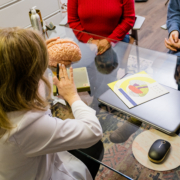6 Ways to Bring Joy to a Person with Alzheimer’s Disease
It’s hard to watch dementia slowly descend, bit by bit, over someone you love. At various times, they may be confused and agitated, or angry and frustrated, or sad and bewildered. In turn, you might feel the same way.
But it is possible to spark some happiness in someone with Alzheimer’s disease. It might even bring a smile to your face, too. Here are a few ways to bring joy:
Music
Music therapy has long been used to soothe people with Alzheimer’s and potentially improve cognitive and behavioral function. Think about how hearing your favorite song can take you back to a special moment in your life. That ability lingers in the brain long after someone with dementia loses the ability to communicate verbally. They can enjoy and respond to music even in the late stages of dementia.
Research has demonstrated the benefits of hosting regular song and music programs in residential programs for people with dementia. It’s part of a larger philosophy of therapy known as reminiscence therapy, which often uses props and other items to evoke memories or positive feelings. Research suggests that it might even temporarily boost mood and communication.
However, people with Alzheimer’s don’t need a special class to be able to enjoy memories sparked by music. You could play some recorded music for them or even suggest that they sing along with you. You could also buy a simplified music player designed for people with dementia.
Special Foods
Did you grow up eating a particular type of cuisine? You probably have a few special favorites from childhood. Maybe it was your mother’s chicken and dumplings, your great auntie’s lumpia or your grandmother’s pozole. People with dementia can still appreciate food that reminds them of their cultural heritage. Research shows that dietary habits and taste are established early in life, and people don’t really forget those beloved foods.
If you have a loved one with dementia who’s living in a nursing home, talk to the director of food services and ask about serving some of their favorite dishes. You may also be able to bring in a beloved dish from time to time. It may help your loved one feel cared for and strengthen their sense of cultural identity, as well as encourage them to eat and take in nutrients.
Improvisational Play
We never really outgrow the joy of play, and dementia can’t take away that joy. Comedy or some other type of improvisational play can generate amusement and laughter, which can help people with dementia with their memory, sociability and self-esteem.
Some research suggests that it’s more beneficial to a person in the earlier stages of Alzheimer’s to be actively performing than to just sit back and enjoy someone else’s performance. It doesn’t have to be elaborate play, however. Some experts suggest that simple improvisational play activities may be better for many people with dementia. Think of the “yes, and” tenet of improv. Maybe ask the person to tell you a story or dance to a piece of music, anything that allows them to use their imagination—without being told “no” or being corrected.
The point is to engage the person and meet them where they are. Enjoying themselves in the moment can help them feel safe.
Favorite Hobbies
If your loved one has a lifelong love of knitting, crocheting or puzzles, they may still be able to enjoy their hobby, even with dementia and especially if the dementia is not too advanced yet. In fact, feeling the tools in their hands can be a good memory trigger. Knitting or crafting with others can be a great social activity, too.
However, assisted care facilities and memory care units typically have rules about items that may not be safe for residents, which may include some hobby supplies such as scissors, letter openers or items made of glass. You may need to bring certain supplies with you when you leave, or store them with a staff member.
Puppetry
Puppet shows have entertained countless children (and more than a few adults, too). Now experts are suggesting that playing with puppets can also open up new possibilities for people with Alzheimer’s disease. Creativity and imagination are not limited by the boundaries of dementia. Karrie Marshall, author of “Puppetry in Dementia Care: Connecting Through Creativity and Joy,” uses the phrase “creative encounter” to describe the connections people can make when engaging with puppets. The puppets can spark memories and generate emotions, as well as improve cognitive function and even promote self-esteem.
Dogs
A visit from human’s best friend could be just the way to bring a smile to the face of someone with dementia, especially for lifelong animal lovers. Research suggests that animal-assisted therapy with a specially trained dog can reduce stress, improve mood and even stimulate cognitive function in people with Alzheimer’s disease. The person with Alzheimer’s isn’t the only one who might enjoy the chance to play some simple games like “fetch” with a dog. This kind of activity can also be fun for caregivers and families, who may experience some relief as they watch their loved one have fun again.









